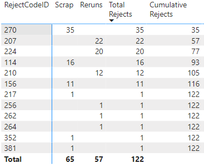FabCon is coming to Atlanta
Join us at FabCon Atlanta from March 16 - 20, 2026, for the ultimate Fabric, Power BI, AI and SQL community-led event. Save $200 with code FABCOMM.
Register now!- Power BI forums
- Get Help with Power BI
- Desktop
- Service
- Report Server
- Power Query
- Mobile Apps
- Developer
- DAX Commands and Tips
- Custom Visuals Development Discussion
- Health and Life Sciences
- Power BI Spanish forums
- Translated Spanish Desktop
- Training and Consulting
- Instructor Led Training
- Dashboard in a Day for Women, by Women
- Galleries
- Data Stories Gallery
- Themes Gallery
- Contests Gallery
- QuickViz Gallery
- Quick Measures Gallery
- Visual Calculations Gallery
- Notebook Gallery
- Translytical Task Flow Gallery
- TMDL Gallery
- R Script Showcase
- Webinars and Video Gallery
- Ideas
- Custom Visuals Ideas (read-only)
- Issues
- Issues
- Events
- Upcoming Events
The Power BI Data Visualization World Championships is back! Get ahead of the game and start preparing now! Learn more
- Power BI forums
- Forums
- Get Help with Power BI
- DAX Commands and Tips
- Re: Inaccurate Cumulative Sum
- Subscribe to RSS Feed
- Mark Topic as New
- Mark Topic as Read
- Float this Topic for Current User
- Bookmark
- Subscribe
- Printer Friendly Page
- Mark as New
- Bookmark
- Subscribe
- Mute
- Subscribe to RSS Feed
- Permalink
- Report Inappropriate Content
Inaccurate Cumulative Sum
Hi, having trouble getting the cumulative sum accurate. Filter issue?
Setup:
Two tables: 'Rerun'[RejectCodeID];[Units] and 'Scrap'[RejectCodeID]; [Units].
One to many: Dimension table 'RejectCode'[RejectCodeID]
The Dax measure I use calculates the cumulative sum of rejects incorrectly after 116.
It sould been 35, 57, 77, 93, 105, 117, 118, 119, 120, 121, 122.
Cumulative Rejects =
VAR TotalRejects = [Reruns] + [Scrap]
Return
SUMX(
FILTER(
SUMMARIZE( ALLSELECTED('RejectCode'), 'RejectCode'[RejectCodeID],
"Rejects", [Scrap] + [Reruns] ),
[Rejects] >= TotalRejects ),
[Rejects] )Any ideas on what can be wrong?
Thanks!
Solved! Go to Solution.
- Mark as New
- Bookmark
- Subscribe
- Mute
- Subscribe to RSS Feed
- Permalink
- Report Inappropriate Content
Hi @Salle ,
I'm suspecting you're trying to accumulate based on total largest to smallest, and you can check the results as follows:
Rank =
VAR _1=RANKX('Table (2)','Table (2)'[Total],,DESC,Dense)
VAR _2 =
RANKX('Table (2)','Table (2)'[RejectCodeID],,ASC,Dense)/ POWER(10,ROUNDDOWN(COUNT('Table (2)'[RejectCodeID])/10,0)+1)
RETURN
_1 + _2
Cumulative Rejects =
VAR TotalRejects = [Re] + [Sc]
Return
CALCULATE(
SUM('Table (2)'[Total]),
FILTER(
ALLSELECTED('Table (2)'),
'Table (2)'[Rank] <= MAX('Table (2)'[Rank])
)
)
An attachment for your reference. Hope it helps!
Best regards,
Community Support Team_ Scott Chang
If this post helps then please consider Accept it as the solution to help the other members find it more quickly.
- Mark as New
- Bookmark
- Subscribe
- Mute
- Subscribe to RSS Feed
- Permalink
- Report Inappropriate Content
Hi @Salle ,
I'm suspecting you're trying to accumulate based on total largest to smallest, and you can check the results as follows:
Rank =
VAR _1=RANKX('Table (2)','Table (2)'[Total],,DESC,Dense)
VAR _2 =
RANKX('Table (2)','Table (2)'[RejectCodeID],,ASC,Dense)/ POWER(10,ROUNDDOWN(COUNT('Table (2)'[RejectCodeID])/10,0)+1)
RETURN
_1 + _2
Cumulative Rejects =
VAR TotalRejects = [Re] + [Sc]
Return
CALCULATE(
SUM('Table (2)'[Total]),
FILTER(
ALLSELECTED('Table (2)'),
'Table (2)'[Rank] <= MAX('Table (2)'[Rank])
)
)
An attachment for your reference. Hope it helps!
Best regards,
Community Support Team_ Scott Chang
If this post helps then please consider Accept it as the solution to help the other members find it more quickly.
- Mark as New
- Bookmark
- Subscribe
- Mute
- Subscribe to RSS Feed
- Permalink
- Report Inappropriate Content
Hi @Salle
Try this measure ,
Measure=Calculate (Rejects+Scraps,Filter(All(Dimdate),Date column<=Max(Date))
Thanks,
Thennarasu R
If this post helps then please consider accepeted the solution to help the other members find it more quickly.
- Mark as New
- Bookmark
- Subscribe
- Mute
- Subscribe to RSS Feed
- Permalink
- Report Inappropriate Content
It does not work.
I want to plot a pareto chart with RejectionCodeID as bars and Pareto curve as line. But first the cumulative sum must be accurate.
Helpful resources

Power BI Dataviz World Championships
The Power BI Data Visualization World Championships is back! Get ahead of the game and start preparing now!

| User | Count |
|---|---|
| 14 | |
| 7 | |
| 4 | |
| 4 | |
| 3 |
| User | Count |
|---|---|
| 23 | |
| 10 | |
| 10 | |
| 6 | |
| 5 |



